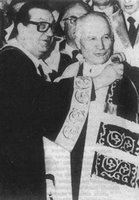Higher Education Act
Law Number: 2547
Date of enactment: November 4, 1981
Published in the Official Gazette No: 17506;
Date: November 6, 1981
PART TWO
GENERAL PROVISIONS
Aims
ARTICLE 4
The aims of higher education:
a) To educate students so that they:

1. will be loyal to Atatürk nationalism and to Atatürk’s reforms and principles,
2. will be in accord with the national, ethical, human, spiritual and cultural values of the Turkish Nation and conscious of the privilege of being a Turk,
3. will put the common good above their own personal interests and have full devotion to family, country and nation,
4. will be fully conscious of their duties and responsibilities towards their country and will act accordingly,

5. will be objective, broad-minded, and respectful of human rights,
6. will develop in a balanced way, physically, mentally, psychologically, morally, and emotionally,
7. will prove to be good citizens contributing to the country’s development and welfare and at the same time acquire the necessary knowledge and skills for their future vocations.
b) To enhance the welfare of the Turkish State as a whole, conducive to national and territorial indivisibility; to implement programs contributing to and accelerating the economic, social and cultural development of the country; and to ensure that students are constructive, creative and outstanding participants in contemporary civilization.

c) As higher educational institutions, to carry out studies and research of high academic level, to promote knowledge and technology, to disseminate scientific findings to assist progress and development at the national level, and, through cooperation with national and international institutions, to become recognized members of the academic world and contribute to universal, contemporary progress.
Basic Principles
ARTICLE 5
Higher education is organized, planned, and programmed in accordance with the following basic principles:
a) To ensure that students develop a sense of duty in line with Atatürk’s reforms and principles, loyal to Atatürk nationalism.

b) National culture integrated with universal culture, will be developed and fostered in keeping with Turkish mores and traditions so that the students develop a strong sense of national unity and solidarity.
c) The principle of basic unity within the educational system is to be achieved with due regard to the aims and goals, and particular characteristics of various higher educational institutions and fields of study.
d) Short and long term plans and programs are to be devised on the basis of scientific and technological principles, in accordance with national and regional needs, and will be regularly up-dated.
e) Measures are to be taken to secure equality of opportunity in higher education.
f) New universities and higher institutes of technology as well as new faculties, graduate schools, and schools of higher education within universities are established by law upon the recommendation or proposal of the Council of Higher Education in accordance with the principles and goals of national development plans and within the context of higher education planning.
g) Vocational schools of higher education attached to ministries are founded by a decision of the Council of Ministers on the basis of principles set forth by the Council of Higher Education.
h) Developing institutions of higher education, improving their efficiency, increasing their numbers so as to cover the whole country, training teaching staff in-country and abroad, and their proper assignment; securing a balance between manpower needs and education; distribution of resources and specialized manpower and education; meeting the national and local needs and specific requirements of the fields of practice in accordance with the principles and aims of the national education policy and the national development plans, are planned and achieved in a manner to cover formal and non-formal, continuing, and distance education.
i) In the course of education in the institutions of higher education, Atatürk’s Principles and the History of the Turkish Reforms, the Turkish language and a foreign language are all compulsory courses. In addition, a non-compulsory course in physical education or in one of the fine arts shall be included in the curriculum. All of these courses are to be planned and implemented for a minimum of two semesters.






